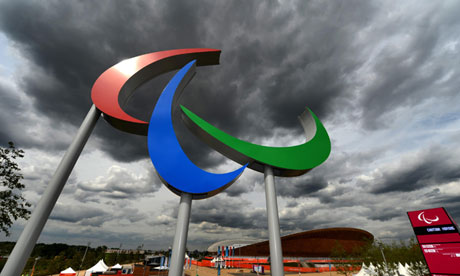
The organisers of the Paralympic Games have come under fire for imposing an "unfair" ticketing system on wheelchair users that forces them to make calls costing up to 41p a minute to see if they can reserve a space at venues.
In a system branded discriminatory by some critics, Locog tells people trying to book wheelchair tickets that they must call an 0844 number – which, according to Ofcom, costs between 1p and 13p a minute from a landline and 15p-41p from a mobile phone. Able-bodied fans can buy tickets online without any extra costs.
The discrepancy has provoked outrage among disabled people, who have set up a 780-member Facebook campaign group called "Stop the Olympics from discriminating against wheelchair users!" to vent their fury.
Gerry Sutcliffe, a former Labour sports minister who chairs the all-party parliamentary group on disability sports, said he had raised the "unfair" system with Locog.
"The organising committee have done a fantastic job but there is discrimination against those people who are wheelchair users, who are going to have to use this premium rate," he added.
"We are not talking about vast amounts of money here against the context of the Games but it is the principle of the thing. For this small group of people who have had to pay the premium rate, we should find a way of compensating them."
Speaking at St Paul's Cathedral before a service to mark the opening of the Games, Paralympian Dame Tanni Grey-Thompson defended the Locog policy, saying the phone line was there to provide customers with a special service and that the intentions behind it "were good". But, of the call charges facing wheelchair users, she added: "Basically the figures I've heard are between 5p and 35p a minute. Obviously 5p is kind of OK; 35p is not."
Asked about the charges, Jeremy Hunt, the culture secretary, said he agreed there was an issue, but insisted it was minor. "I think you have to look at the thing as a whole and say, 'Are we doing enough? Are we doing more than we have ever done for people who are disabled so they can enjoy the spectacle?' And we are, we are doing a huge amount," he told the BBC.
"What we're doing is more than has been done before. You are picking on one thing we're not doing, but actually, overall, we have done more in this Paralympics organisation for disabled people because we want them to feel part of it."
In a statement, Locog said the phone line was a bespoke service to "ensure customers could discuss their individual accessibility needs" at the Games. It had introduced the phone line in May, it added, after offering wheelchair spaces online since September last year, so that it could sell to specific seats rather than to a price category. Locog said it was not making any money from the line.
"We are proud to do more for spectators with accessibility needs than any other sporting event in this country," Locog's statement said. "We offer free Games mobility scooters at Games venues, free blue badge parking and a free companion seat for every wheelchair space. We exceeded UK legislation and sports ground guidance for providing more accessible seating and wheelchair positions than any other sports stadium in the country."

